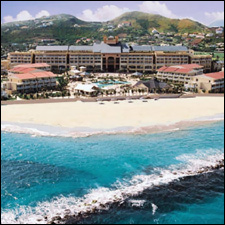
The Marriott Resort – St. Kitts
Photo By Erasmus Williams
Basseterre, St. Kitts – Nevis
August 07, 2011 (CUOPM)
Plans by the St. Kitts Marriott to build a small but elite hospital within two years in a new beachside building on the Atlantic, with resplendent ocean views and sumptuous resort amenities is making news in the United States.
Loretta McLaughlin, a former editor of the Boston Globe editorial pages and a senior fellow at the Harvard AIDS Initiative, in an article wrote the specialty hospital is part of a growing trend by Americans (and others from economically advanced countries) to combine medical treatment with vacation. In 2008, 1.3 million Americans traveled outside the United States, primarily for elective surgery; the number is expected to triple by 2012.
Americans are going to overseas centers for two good reasons – far lower health costs and high quality of care – not to mention the exceptional personal comfort provided at these centers. Some American health insurers are exploring coverage for their clients for the same reasons.
After all, why should a health insurance company, any more than an individual, pay three times as much for a surgical procedure – to repair a hernia, for example – in a stateside local hospital when it could be done just as well in the Caribbean? And patients could recover with hotel services at their fingertips.
A few health insurers already provide medical tourism coverage, including Blue Cross Blue Shield of South Carolina and Georgia-based BasicPlus Insurance Services. Some US employers are looking into it with an eye on cutting employee health costs. In January 2008, Hannaford Bros., a supermarket chain based in Maine, began paying the entire bill for employees to travel to Singapore for hip and knee replacements, including travel for the patient and a companion. Some unions, however, have raised issues of legal liability and potential job losses in the US health care industry if hospital treatment is outsourced.
Dr. John Fallon of Blue Cross Blue Shield of Massachusetts says there has been little demand for it locally, but that Blue Cross is keeping close watch on how well the quality of care in these low-cost overseas centers is measured.
It is chiefly because construction and support services are but a fraction of their comparable costs in the United States that prices for medical tourism can be so low. “Any hospital we undertake has strong quality assurance built in,” said Dr. Gregory Ciottone, chief medical officer of the American Hospital Management Company in Washington, which has managed several low-cost overseas centers. They include continuing medical education for the staff and certification by the Joint Commission International, a US-based, nonprofit organization that accredits hospitals and monitors quality standards throughout the world.
In the early years of medical tourism nearly 20 years ago, most Americans who went overseas for medical care were looking for cosmetic surgery. A decade later, the big draw was – and still is – dental implants.
Now the field is wide open. Americans seeking such care include middle-income people who either lack insurance coverage or who would have very high deductibles if they rely on hometown practitioners. They also know they can turn to their primary-care doctors back home if complications develop.
Among the multitude of Americans who have taken advantage of medical tourism is Larry Oehler of Conifer, Colo. In need of three dental implants for which he received an estimated cost of $25,000 to $30,000 locally, he went to a medical tourist center in Costa Rica last year.
He underwent delicate bone grafts and other procedures to support the implants, and had considerably more dental work done than first anticipated – all for a price of $18,000. “The clinic was modern, up-to-date, comfortable, and clean. And I had a highly skilled oral surgeon, who was most reassuring,” Oehler said recently.
These hospitals also have a huge side benefit for natives in developing countries. The new specialty centers mean they, too, gain instant access to modern, high-tech medical care under payment programs typically arranged with their governments.
But the growing lure of medical tourism for Americans is the happy prospect of having medical procedures capably carried out at bargain prices – along with a recovery spent basking in a chaise longue at poolside.